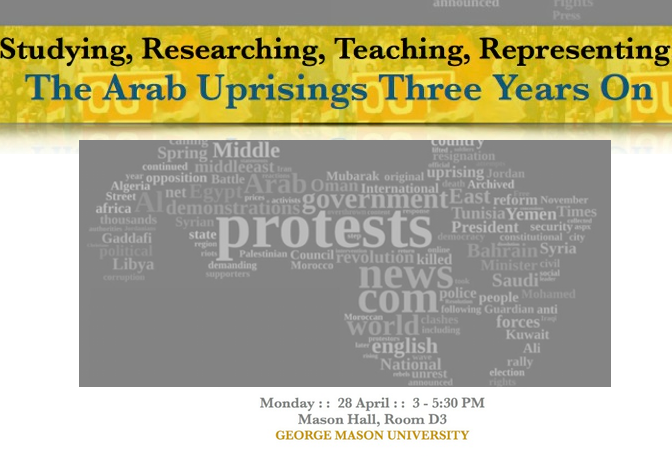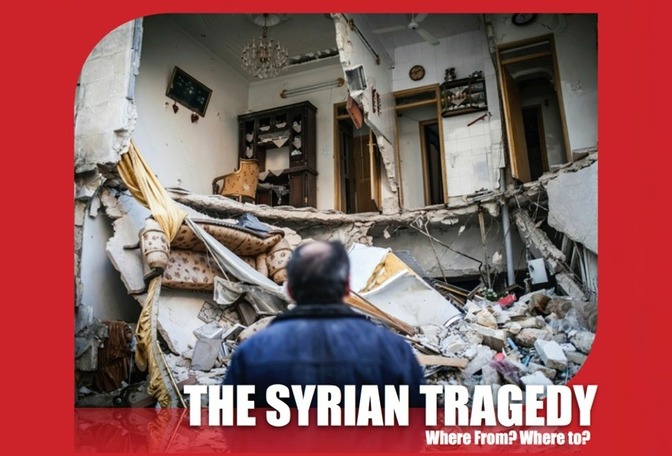- FAMA
- Researchers
-
Projects
- MESPI
- Knowledge Production Project >
-
Political Economy Project
>
- Development and the Uprisings
- Class Formations and Dynamics
- The Palestinian Economy: Fragmentation and Colonization
- Tunisia: A Political Economy in Transition
- Migrant States, Mobile Economies: Rethinking the Political in Contemporary Turkey
- Political Economy of the Middle East: Continuities & Discontinuities in Teaching & Research
- 2016 Political Economy Institute
- The Lebanon Project >
- The Palestine Project >
- The Civil Society Project >
- Middle East Media Project >
- The Egypt Project >
- Refugees and Migrants Project >
- Black-Palestinian Transnational Solidarities Project
- Initiatives
- Events
- Summer Institutes
- Internships
- Blog
|
April 28, 2014 @ 3:00pm - 5:30pm
Mason Hall, Room D3 George Mason University Fairfax, Virginia Presented by Middle East Studies Program, Center for Global Islamic Studies, Arab Studies Institute, Public & International Affairs Department Light Fare and Refreshments Served Featuring... Lisa Hajjar: On Human Rights (UCSB) Bassam Haddad: On Syria (GMU) Ziad Abu-Rish: On Jordan (UCLA) Peter Mandaville: On Islamists (GMU) Mouin Rabbani: On Palestine (ASI) Nadya Sbaiti: On Lebanon (Smith College) Adel Iskandar: On The Media (Georgetown) Elliott Colla: On Literature (Georgetown) Noura Erakat: On Law (Temple) KNOWLEDGE PRODUCTION ON THE MIDDLE EAST How has the region been studied, researched, taught, and represented in the past three years? What have we learned about the societies, regional/international relations, and political-economic dynamics of Arab countries? What are the salient debates in the region? Have counter-revolutionary forces triumphed? How did external intervention promote or hinder the uprisings? Is it time to do away with the secular/Islamist binary? Are we likely to see more equitable distribution of resources in the region? Beyond politics, how have cultural elements/forms been affected, developed, and/or created? Join us for some answers. Lisa Hajjar is a professor of sociology at the University of California -- Santa Barbara. Her research and writing focus on law and legality, war and conflict, human rights, and torture. She is the author of Courting Conflict: The Israeli Military Court System in the West Bank and Gaza (University of California Press, 2005) and Torture: A Sociology of Violence and Human Rights (Routledge, 2012). In addition to being a Co-Editor at Jadaliyya, she serves on the editorial committees of Middle East Report and Journal of Palestine Studies. She is currently working on a book about anti-torture lawyering in the United States. In 2014-2015, she will be the Edward Said Chair of American Studies at the American University of Beirut. Bassam Haddad is Director of the Middle East Studies Program and Associate Professor in the Department of Public and International Affairs at George Mason University, and is Visiting Professor at Georgetown University. He is the author of Business Networks in Syria: The Political Economy of Authoritarian Resilience (Stanford University Press, 2011). Bassam is currently editing a volume on Teaching the Middle East After the Arab Uprisings, a book manuscript on pedagogical and theoretical approaches. His most recent book is a co-edited volume with the title Dawn of the Arab Uprisings: End of an Old Order? (Pluto Press, 2012). Bassam serves as Founding Editor of the Arab Studies Journal a peer-reviewed research publication and is co-producer/director of the award-winning documentary film, About Baghdad, and director of a critically acclaimed film series on Arabs and Terrorism, based on extensive field research/interviews. More recently, he directed a film on Arab/Muslim immigrants in Europe, titled The "Other" Threat. Bassam is Co-Founder/Editor of Jadaliyya Ezine and serves on the Editorial Committee of Middle East Report. He is the Executive Director of the Arab Studies Institute, an umbrella for five organizations dealing with knowledge production on the Middle East, and Founding Editor of Tadween Publishing. Ziad Abu-Rish is currently a doctoral candidate in the Department of History at the University of California Los Angeles (UCLA). He is co-editor ofThe Dawn of the Arab Uprisings: End of An Older Order? (2012), and author of "Protests, Regime Stability, and the History of Authoritarian State Formation in Jordan" in the forthcoming edited volume Beyond the Arab Spring: The Evolving Ruling Bargain in the Middle East (2014). Ziad serves as a senior editor of the Arab Studies Journal, and is a co-editor of Jadaliyya. In fall 2014, he will begin his position as assistant professor of Middle East history at Ohio University. Peter Mandaville is a professor of government & politics and Co-Director of the Ali Vural Ak Center for Global Islamic Studies at George Mason University, where he also directs the graduate program in Middle East & Islamic Studies. He is the author of Islam & Politics (2nd edition, forthcoming 2014) and Reimagining the Ummah: Transnational Muslim Politics (2001) as well as co-editor of several volumes of essays in the fields of international relations, Islamic Studies, and comparative politics. He has also worked and consulted extensively in the non-profit, think tank, and government sectors. His research has been supported by the Carnegie Corporation of New York, the John D. and Catherine T. MacArthur Foundation, the Social Science Research Council, and the National Endowment for the Humanities. Mouin Rabbani is a Senior Fellow with the Institute for Palestine Studies, Contributing Editor of Middle East Report and Policy Advisor with Al-Shabaka. He has published and commented widely on Palestinian affairs, the Arab-Israeli conflict and the contemporary Middle East. He was formerly a Senior Middle East Analyst with the International Crisis Group, Palestine Director of the Palestinian American Research Centre, and researcher with Al-Haq. He is Co-Editor of Jadaliyya Ezine. Nadya Sbaiti is Assistant Professor of History at Smith and Mount Holyoke Colleges. She is co-editor of theArab Studies Journal, and a co-founder of Jadaliyya.com. Adel Iskandar is a scholar of Arab studies whose research focuses on media and communication. He is the author, coauthor, and editor of several works including Al-Jazeera: The Story of the Network that is Rattling Governments and Redefining Modern Journalism, Edward Said: A Legacy of Emancipation and Representation (University of California Press), and Mediating the Arab Uprisings (Tadween Publishing). Iskandar's work deals with media, identity and politics and has lectured extensively on these topics at universities worldwide. His most recent publication is the authored anthology Egypt In Flux: Essays on an Unfinished Revolution (AUC Press). Iskandar teaches at the Center for Contemporary Arab Studies and the Communication, Culture, and Technology program at Georgetown University in Washington, DC. Elliott Colla is author of Baghdad Central and Conflicted Antiquities: Egyptology, Egyptomania, Egyptian Modernity. He is also translator of works of Arabic literature, including Ibrahim Aslan's The Heron, Idris Ali's Poor, Ibrahim Al-Koni's Gold Dust and Raba'i al-Madhoun's The Lady from Tel Aviv. He is Associate Professor and Chair of the Department of Arabic and Islamic Studies at Georgetown University. Noura Erakat is a human rights attorney and writer. She is currently a Freedman Teaching Fellow at Temple University, Beasley School of Law and is a member of the Legal Support Network for the Badil Center for Palestinian Refugee and Residency Rights. She has taught International Human Rights Law and the Middle East at Georgetown University since 2009. Most recently she served as Legal Counsel for a Congressional Subcommittee in the House of Representatives, chaired by Congressman Dennis J. Kucinich. She has helped to initiate and organize several national formations including Arab Women Arising for Justice (AMWAJ) and the U.S. Palestinian Community Network (USPCN). She is a board member of the Institute for Policy Studies; a Policy Advisor of Al-Shabaka; a founding member of the DC Palestinian Film and Arts Festival; and a contributor toIntLawGrrls. Noura has appeared on MSNBC's "Up With Chris Hayes," Fox’s “The O’ Reilly Factor,” NBC’s“Politically Incorrect,” Democracy Now, and Al-JazeeraArabic and English. Her scholarly publications include: "Litigating the Arab-Israeli Conflict: The Politicization of U.S. Federal Courts" in the Berkeley Law Journal of Middle Eastern and Islamic Law, "U.S. vs. ICRC-Customary International Humanitarian Law and Universal Jurisdiction" in the Denver Journal of International Law & Policy, and “New Imminence in the Time of Obama: The Impact of Targeted Killings on the Law of Self-Defense” forthcoming in the Arizona Law Review. She is a Co-Editor of Jadaliyya.com. She will begin teaching in the New Century College at George Mason University in the Fall 2014.
0 Comments
April 3, 2014 @ 3:00pm - 5:00pm
Johnson Center Cinema George Mason University Fairfax, Virginia Presented by the Middle East Studies & Arab Studies Institute. C0-Sponsored by Global Interdisciplinary Programs, Center for Global Islamic Studies, Center For Global Studies, Department of Public and International Affairs Featuring... Omar Dahi • Hampshire College/Jadaliyya Material Roots of the Uprising: Rethinking the Economic Thesis Rochelle Davis • Georgetown University Gender, Danger, and Vulnerability: Syrian Men and War Yasser Munif • Emerson College Participatory Democracy and Local Governance in Manbij Ibrahim Hamidi • Al-Hayat Newspaper, London Reporting on Syria Lisa Wedeen • University of Chicago/Jadaliyya Scenes of Generational Change: Notes from the Syrian Uprising Bassam Haddad • George Mason University/Jadaliyya Understanding the Syrian Tragedy: Economics, Politics, and Regional Relations Daniel Neep • Georgetown University Class, Sect, and the State Prior to the Uprising Osama Esber • Tadween Publishing Syrian Writers/Intellectuals and the Uprising SPEAKER BIOGRAPHIESBassam Haddad is Director of the Middle East Studies Program and Associate Professor in the Department of Public and International Affairs at George Mason University, and is Visiting Professor at Georgetown University. He is the author of Business Networks in Syria: The Political Economy of Authoritarian Resilience (Stanford University Press, 2011). Bassam is currently editing a volume on Teaching the Middle East After the Arab Uprisings, a book manuscript on pedagogical and theoretical approaches. His most recent book is a co-edited volume with the title Dawn of the Arab Uprisings: End of an Old Order? (Pluto Press, 2012). Bassam serves as Founding Editor of the Arab Studies Journal a peer-reviewed research publication and is co-producer/director of the award-winning documentary film, About Baghdad, and director of a critically acclaimed film series on Arabs and Terrorism, based on extensive field research/interviews. More recently, he directed a film on Arab/Muslim immigrants in Europe, titled The "Other" Threat. Bassam is Co-Founder/Editor of Jadaliyya Ezine and serves on the Editorial Committee of Middle East Report. He is the Executive Director of the Arab Studies Institute, an umbrella for five organizations dealing with knowledge production on the Middle East, and Founding Editor of Tadween Publishing. Osama Esber is a Syrian poet, short story writer, publisher and translator who presently lives in Chicago. He is director of the publishing House Bidayat (Beginnings) based in Damscus. Among his poetry collections are: Screens of History (1994); The Accord of Waves (1995); Repeated Sunrise over Exile (2004); and Where He Doesn’t Live (2006). His short story collections are entitled The Autobiography of Diamonds (1996); Coffee of the Dead (2000); and Rhythms of a Different Time (in process). He has translated works by Michael Ondaatje, Terry Eagleton, Richard Ford, Bertrand Russell, Toni Morrison, Nadine Gordimer, and Noam Chomsky, to name a few. Daniel Neep is Assistant Professor in Comparative Politics at the Center for Contemporary Arab Studies, Georgetown University. Prior to joining Georgetown in 2013, he was a Lecturer (Assistant Professor) at the Department of Politics at the University of Exeter, England. He also worked for nearly 3 years as Research Director (Syria) for the Council for British Research in the Levant (CBRL), in which capacity he was based in Damascus throughout the first year of the Syrian uprising before relocating to Amman, Jordan. Before moving into academia, Neep was Head of the Middle East & North Africa Programme at the Royal United Services Institute for Defence and Security Studies (RUSI), a foreign policy think tank in London, from 2002 to 2004. He has spent several years in Syria since the late 1990s, variously studying, working, and researching. He is the author of Occupying Syria under the French Mandate: Space, Insurgency and State Formation (Cambridge University Press, 2012). He is currently working on a new research project looking at the spatial and economic dimensions of state formation in Syria from 1920 to 2011. Rochelle Davis is an Associate Professor of Anthropology and Academic Director in the Center for Contemporary Arab Studies at Georgetown University. Her Ph.D. is from the University of Michigan in Modern Arabic Literature and Anthropology. Her research focuses on refugees and conflict. She’s published numerous reports on Syrian refugees post-2011, Iraqi refugees who fled to Jordan, and a book, Palestinian Village Histories: Geographies of the Displaced (Stanford University Press, 2010), which addresses how Palestinian refugees today write histories of their villages that were destroyed in the 1948 war. Yasser Munif is a professor of sociology at Emerson College where he teaches courses on nationalism, political economy, Middle Eastern politics, and social movements. He recently spent several months in Northern Syria where he is conducting research on local governance, post-Assad reconstruction, and internally displaced persons. He is a co-founder of the "Global Campaign of Solidarity with the Syrian Revolution" which aims to shed light on grassroots resistance and everyday struggles in Syria. Lisa Wedeen is the Mary R. Morton Professor of Political Science and the College and the Co-Director of the Chicago Center for Contemporary Theory at the University of Chicago. Her publications include Ambiguities of Domination: Politics, Rhetoric, and Symbols in Contemporary Syria (1999); “Conceptualizing ‘Culture’: Possibilities for Political Science” (2002); “Concepts and Commitments in the Study of Democracy” (2004),Peripheral Visions: Publics, Power and Performance in Yemen (2008), “Ethnography as an Interpretive Enterprise” (2009), “Reflections on Ethnographic Work in Political Science” (2010), and “Ideology and Humor in Dark Times: Notes from Syria” (2013). She is the recipient of the David Collier Mid-Career Achievement Award and an NSF fellowship. She is currently working on a book about ideological interpellation, neoliberal autocracy, and generational change in present-day Syria. Ibrahim Hamidi is a Syrian journalist, who heads the Damascus bureau of Arab daily newspaper Al-Hayat, and contributes to several other international media outlets and thinktanks. Previously, he served as head of the Lebanese Broadcasting Corporation (LBC) office in Damascus, in addition to his work with al-Hayat, and as a senior writer for Forward Magazine in Damascus. Hamidi's work focuses on strategic issues in the Middle East, with special insight into Syria's internal and regional politics. He is also a Research Fellow and co-founder of the Syrian Studies Center at the University of St Andrews in Scotland. Hamidi is also a co-founder of the Arab Investigative Journalism Program (ARIJ). Hamidi is married to writer and novelist Dima Wannous, daughter of the acclaimed Syrian playwright Saadallah Wannous. Omar S. Dahi is an associate professor of economics at Hampshire College and a visiting fellow at the Carnegie Middle East Center. He specializes in economic development and international trade, with a focus on South-South economic relations and the political economy of the Middle East and North Africa. Dahi also serves on the editorial team of the Middle East Report and is co-editor of the Syria page at Jadaliyya. Dahi’s work has been published in various academic journals, including the Journal of Development Economics, Applied Economics, and the Southern Economic Journal. |
Forum on Muslim and Arab AffairsFAMA is the research arm of the Arab Studies Institute. Archives
June 2017
Categories |
- FAMA
- Researchers
-
Projects
- MESPI
- Knowledge Production Project >
-
Political Economy Project
>
- Development and the Uprisings
- Class Formations and Dynamics
- The Palestinian Economy: Fragmentation and Colonization
- Tunisia: A Political Economy in Transition
- Migrant States, Mobile Economies: Rethinking the Political in Contemporary Turkey
- Political Economy of the Middle East: Continuities & Discontinuities in Teaching & Research
- 2016 Political Economy Institute
- The Lebanon Project >
- The Palestine Project >
- The Civil Society Project >
- Middle East Media Project >
- The Egypt Project >
- Refugees and Migrants Project >
- Black-Palestinian Transnational Solidarities Project
- Initiatives
- Events
- Summer Institutes
- Internships
- Blog



 RSS Feed
RSS Feed
